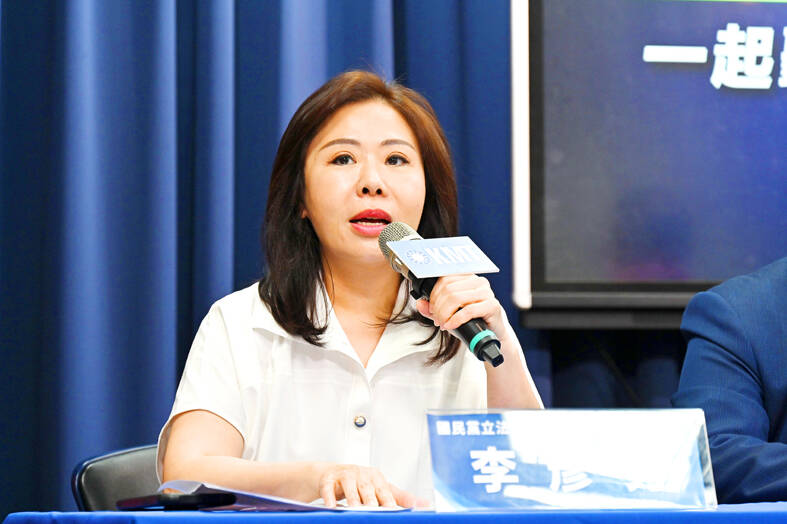The Legislative Yuan, rather than the Constitutional Court, should decide whether the death penalty should be abolished, the Chinese Nationalist Party (KMT) said yesterday, adding that the court should not step on the authority of the legislative branch.
The court today is to hear lawyers representing 37 inmates on death row, Ministry of Justice officials and legal experts debate the constitutionality of the death penalty.
KMT cultural and communications committee director-general Lee Yen-hsiu (李彥秀) told a news conference in Taipei yesterday that a Ministry of Justice survey in 2020 showed that more than 76 percent of respondents opposed abolishing the death penalty, and 56.5 percent said the death penalty should still be in place even if people could be sentenced to life in prison without the possibility of parole.

Photo: Tu Chien-jung, Taipei Times
Whether the death penalty should be abolished should be decided by the legislative branch, and the Constitutional Court should not overstep its authority, Lee said.
Judicial Yuan President and Chief Justice of the Constitutional Court Hsu Tzong-li (許宗力) would only hurt the credibility of the judicial system if he intends to abolish the death penalty as a “graduation gift” to President Tsai Ying-wen (蔡英文) when her term ends next month, she said.
People should not equate capital punishment with disrespecting human rights, KMT Legislator Wu Tsung-hsien (吳宗憲) said, adding that right of the families of victims to seek justice should be considered as well.
The death sentence for murder should not be abolished, but the government could consider eliminating it for other offenses, Wu said.
“We should consider using life imprisonment without the possibility of parole to replace capital punishment to a certain extent,” Wu said.
Taiwan Victim Human Rights Association chairman Chao Wei-han (趙惟漢) said that penetrators of homicides have no right to take lives, adding that justice would be dead if people do not fight to retain the death penalty.
“Courts have stopped sentencing people to death, the justice ministry has stopped executing inmates on death row. The government-funded Association for Victims Support has also stopped speaking for victims of homicides. President Tsai, the Democratic Progressive Party and the Constitutional Court should hear the voice of the people,” Chao said.
Association vice chairman Hsu Fu-sheng (許福生) said victims’ families would experience the pain of losing their loved ones all over again if the government did not execute perpetrators who had been sentenced to death.
“Policymakers should consider the feelings of victims’ families. Taiwanese society has yet to reach a consensus on abolishing capital punishment. If the grand justices declare the death penalty unconstitutional, it would only trigger division and conflict in society,” he said.
Asked about the issue, Premier Chen Chien-jen (陳建仁) told reporters that Taiwan is a free and democratic country and is governed by the rule of law, and separation of powers is a principle clearly stated in the Constitution.
The Judicial Yuan has the right to interpret the Constitution and determine whether the death penalty is constitutional, and the Executive Yuan respects the Judicial Yuan’s authority to do so, he said.

Taipei has once again made it to the top 100 in Oxford Economics’ Global Cities Index 2025 report, moving up five places from last year to 60. The annual index, which was published last month, evaluated 1,000 of the most populated metropolises based on five indices — economics, human capital, quality of life, environment and governance. New York maintained its top spot this year, placing first in the economics index thanks to the strength of its vibrant financial industry and economic stability. Taipei ranked 263rd in economics, 44th in human capital, 15th in quality of life, 284th for environment and 75th in governance,

A former officer in China’s People’s Liberation Army (PLA) who witnessed the aftermath of the 1989 Tiananmen Square massacre has warned that Taiwan could face a similar fate if China attempts to unify the country by force. Li Xiaoming (李曉明), who was deployed to Beijing as a junior officer during the crackdown, said Taiwanese people should study the massacre carefully, because it offers a glimpse of what Beijing is willing to do to suppress dissent. “What happened in Tiananmen Square could happen in Taiwan too,” Li told CNA in a May 22 interview, ahead of the massacre’s 36th anniversary. “If Taiwanese students or

Greenpeace yesterday said that it is to appeal a decision last month by the Taipei High Administrative Court to dismiss its 2021 lawsuit against the Ministry of Economic Affairs over “loose” regulations governing major corporate electricity consumers. The climate-related lawsuit — the first of its kind in Taiwan — sought to require the government to enforce higher green energy thresholds on major corporations to reduce emissions in light of climate change and an uptick in extreme weather. The suit, filed by Greenpeace East Asia, the Environmental Jurists Association and four individual plaintiffs, was dismissed on May 8 following four years of litigation. The

The New Taipei City Government would assist relatives of those killed or injured in last month’s car-ramming incident in Sansia District (三峽) to secure compensation, Mayor Hou You-yi (侯友宜) said yesterday, two days after the driver died in a hospital. “The city government will do its best to help the relatives of the car crash incident seek compensation,” Hou said. The mayor also said that the city’s Legal Affairs, Education and Social Welfare departments have established a joint mechanism to “provide coordinated assistance” to victims and their families. Three people were killed and 12 injured when a car plowed into schoolchildren and their